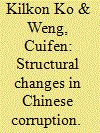| Srl | Item |
| 1 |
ID:
104203


|
|
|
|
|
| Publication |
2011.
|
| Summary/Abstract |
This paper examines definitions of Chinese corruption. While many Chinese corruption studies have argued that Chinese corruption has its own unique features, our review of definitions of Chinese corruption featured in current academic literature reveals that most definitions in use are similar to the general definition of corruption: abuse of public office for private gains. Valuable as it is, such a general definition does not adequately specify the actors, behavior and motives in Chinese corruption. This paper argues that actors in Chinese corruption are not limited to employees in the public sector but also include any Chinese state functionary engaging in public activities. In addition, corrupt behavior refers to both economic (embezzlement, misappropriation of public funds, and bribery) and disciplinary corruption (violation of social norms and the dereliction of duty) that are damaging to public interests. In doing so, this paper finds that even behavior such as the dereliction of duty and violations of social norms, that is not motivated by private gain, is regarded as corruption in China. We also discuss the political nature of this broadly defined Chinese corruption.
|
|
|
|
|
|
|
|
|
|
|
|
|
|
|
|
| 2 |
ID:
119184


|
|
|
|
|
| Publication |
2012.
|
| Summary/Abstract |
Given the rapid economic and administrative evolution that China has undergone during the last three decades, it is likely that corruption in China has been directly and indirectly affected by the changes that have taken place. However, the existing literature pays little attention to the impact of such changes on Chinese corruption, while emphasizing the seriousness of corruption. This article reviews how the major causes of Chinese corruption in the reform era have been alleviated in the 2000s. Some of the recent changes include the progress of the market economy, the advent of a merit-based civil service system, improvement of the budgeting and auditing system, fiscal recentralization and better monitoring of local governments' activities, and progress in anti-corruption regulation and enforcement. Consequently, we hypothesize that changes in the causes of corruption have led to structural changes in Chinese corruption. Our empirical analyses reveal that administrative reform has resulted in a decrease in the number of corruption cases related to the internal administrative process (embezzlement and misappropriation of public funds). At the same time, we also observe the aggravation of bribery. This suggests that Chinese corruption has made a transition from being an administrative issue to being a private-public transactional problem.
|
|
|
|
|
|
|
|
|
|
|
|
|
|
|
|